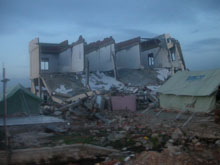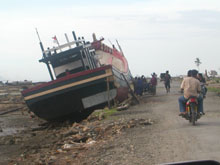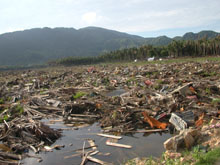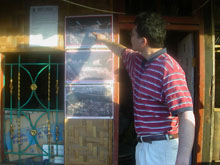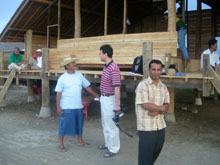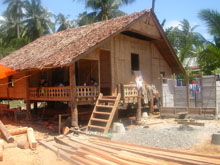| Education
and Qualifications |
Professional Experience |
Other Experience |
Curriculum Vitae |
Contact & Photos | Home Page |
|
||||||||
|
|
||||||||
In the late 1980s, Jeff Dorsey worked extensively on food aid as a component in development assistance, such as road building and other community projects. More recently, he has worked on food security policy and issues in Ethiopia and southern Africa. He has since worked in post-disaster situations in Aceh and Sri Lanka after the tsunami and in Honduras after Hurricane Mitch. His post-tsunami experience in various countries showed how land tenure conflicts impeded development efforts and how microfinance can be a powerful tool to allow people to rebuild their homes, their lives and their livelihoods after a disaster. A few years ago in Honduras, he helped in the aftermath of Hurricane Mitch by assessing damage to various subsectors of agriculture and estimating resources needed for rehabilitation and the best ways of channeling these resources to those affected. He helped a consortium of NGOs headed by CARE to analyze the 20 year war with the Lord’s Resistance Army in Northern Uganda; the study clarified the economic and human costs of the conflict but the two parties still have failed to achieve a negotiated settlement to this cruel and costly war. Work in Guinea brought Jeff in contact with the conflicts in neighboring countries which plagued West Africa for years (Sierra Leone, Liberia, and Casamance) and which have also affected the welfare of people in Guinea and in the entire region. His work in Kosovo hopefully contributed in some small way to promoting productive activities through better access to land and to finance and more peaceful relations between the Kosovar and ethnic Serb communities.
October 2008 to April 2009 18 February to 31 March, 2007 10 September to 20 October 2005 April 2005
Tsunami Reconstruction & Livelihoods Expert, Aceh, Indonesia responsible for housing and livelihoods assessment. 1 to 23 February 2004 Rural Land Tenure/Agriculture Specialist in Kosovo on an ARD team carrying out a study for USAID of land and property rights and their impact on economic development and finance for enterprises including agricultural crops (potatoes, vegetables, etc), dairy, and trout aquaculture and on improving property rights to increase the use of immoveable property as collateral for bank finance. 18 October 2003 to January 26 2004 Agricultural Economist on an ARD team preparing an Agricultural Sector Assessment for USAID/Guinea, focusing on the contribution of the sector to poverty reduction. Responsible for preparing in-depth analysis of key agricultural subsectors and identify their constraints, opportunities and potential interventions over the next five years. Work include in-depth studies of major crops such as cashews, oil palm, rice, irrigated dry season vegetables, marine and continental fisheries and aquaculture, and the marketing of fertilizer and other farm chemicals, and contributing to analysis of the financial sector and its support to agricultural marketing and production. 24 April to 20 May, 2003 Housing Microfinance Expert, Kigali, Rwanda, for the World Council of Credit Unions (WOCCU) analyzing the performance of housing and home improvement lending by Rwandan credit unions and their national union (UBPR) after the genocide. A program for establishing in-house expertise in construction, for improving existing loan products, and for developing a product combining member savings with home purchase finance was designed. New products for commercial construction loans and for salary advances used for home improvement were also proposed. 31 October to 18 December 2002 Senior Agricultural and Food Security Analyst on an evaluation team USAID/Malawi’s program for increasing rural incomes, assessing the impact of 1) the consolidation of the national smallholders producers organization (NASFAM) as a major trading company for exporting and processing smallholder agricultural products, 2) a dairy industry development program with Land O’Lakes, 3) the expansion of rural credit unions, and 4) an HYV-seed-and-fertilizer-for-work project improving food security for low-income families while improving their road access. 1 July to 3 August 2002 Economic Analyst, funded by CARE International on behalf of a consortium of NGOs, responsible for collecting data, modeling the cost of 16 years of conflict in northern Uganda’s Acholiland to the regional and national economies, and contributing to a negotiated solution. 13 April 2002 to 13 June 2002 Marketing and Rural Enterprise Development Expert, DFID-funded project for Teso and Lango farming systems (Soroti and Lira districts in northern Uganda affected by an earlier conflict and currently by the fighting with the Lords Resistance Army), analyzing marketing and enterprise development constraints and identifying opportunities for new and existing crop and livestock activities and service sector businesses, with the aim of integrating this market-oriented focus into the research program of the National Agricultural Research Organization (NARO) and into the extension activities of the National Agricultural Advisory Service (NAADS) in its support formation and development of producer organizations, and of creating specialized competitive grant funds for marketing and enterprise development studies to encourage businesses to expand and to take advantage of the opportunities emerging in the regions. November 30 to December 18, 1998 Agricultural Finance Expert for USAID/ Honduras responsible for reviewing requirements and options for financing agricultural reconstruction after Hurricane Mitch. The mechanisms proposed included refinancing and special lines of credit for participating banks and other financial institutions. 2 May to 30 June 1991
Project analyst, Rome, for FAO's World Food Programme Liaison Office analyzing proposed WFP development projects. 24 April to 4 August 1989
Project Analyst, Rome, in the FAO’s liaison office, providing technical support in design and appraisal of WFP development projects. 16 March to 4 April 1989 Agricultural Economist, Sao Tomé e Principe, FAO evaluating the impact of WFP food aid on rehabilitating cocoa production and processing, encouraging food production by plantation workers and supporting privatization of state farms. 9 July to 9 August 1988 Agricultural Economist, Honduras, FAO evaluating impacts of WFP food aid on production of basic grains and on adoption of soil conservation techniques. |
||||||||
| Up | ||||||||
